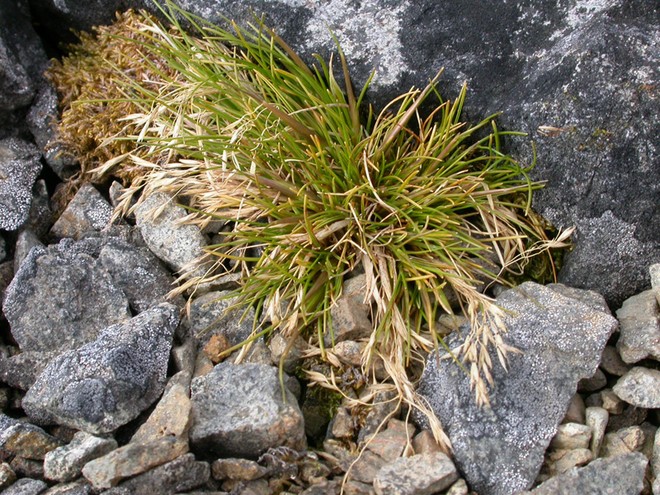Antarctic grass thrives in a changing climate
by British Antarctic Survey on 11 Apr 2011

Antarctic Hairgrass (Deschampsia antarctica) British Antarctic Survey
http://www.antarctica.ac.uk
One plant species that grows in Antarctica appears to be thriving according to a team of UK scientists. Antarctic Hairgrass (Deschampsia antarctica) is more effective at absorbing organic nitrogen from the soil than the mosses that it lives alongside. This finding has implications for understanding how the nitrogen cycle works and is published this week in the first issue of the journal Nature Climate Change – part of the Nature series.
Samples were collected from the ice-free areas around British Antarctic Survey’s (BAS) Signy Research Station in the sub-Antarctic.
Lead author Dr Paul Hill from Bangor University said, 'We think of the Antarctic as a land of snow and ice. But, in summer on the Antarctic Peninsula, and the islands surrounding the frozen centre of the continent, the snow melts and many areas become green with mosses and two species of native flowering plant. As summer air temperatures in the maritime Antarctic have increased by about 1°C over the last 50 years, and Antarctic summers have become longer and warmer, one of these flowering plants, Antarctic Hairgrass (Deschampsia antarctica), has become increasingly widespread.'
Author and principal investigator Professor Davey Jones from Bangor University said, 'Plants need nitrogen to grow successfully. In coastal Antarctica, much of the nitrogen is locked in organic matter in the soil, which has been slow to decompose in the cold conditions. This is now becoming more available as temperatures increase.'
Plants absorb nitrogen from organic matter that breaks down in stages, forming peptides, amino acids and then inorganic nitrogen. The team made the discovery that Antarctic Hairgrass uses its roots to access nitrogen directly as peptides, thus bypassing the final stage and using a shorter sequence. By injecting a trackable nitrogen substance into the soil under the Antarctic Hairgrass the team monitored it being absorbed by the plant.
BAS author Kevin Newsham said, 'These findings have ramifications far beyond Antarctica. If the roots of plants in temperate and tropical regions are consistently found to absorb organic nitrogen in this way, then it could have implications for the management of agriculture in the British Antarctic Survey website
If you want to link to this article then please use this URL: www.sail-world.com/82312

